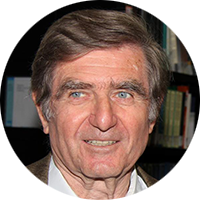Course title:
Neurolinguistics and multilingualism
Course code: PSL214
Course status: elective
Course leader: Vesna Mildner
Course instructor: Damir Horga
Language of instruction: English
Total hours: 8S
Form of instruction: Lectures, tutorials – individual sessions
ECTS credits: 4
Course content by topics:
The basic anatomical and physiological mechanisms of the development and functioning of the nervous system are discussed in the course, with a particular attention paid to speech and language competencies. The course includes an overview of the development of neurolinguistics and neuroscientific methods used in behavioural and instrumental research in neuroscience and their application in neurolinguistics. Theoretical models of neurological processing of oral and written language messages are discussed. A special focus is placed on brain hemispheres dominance and the localization of various functions, and an overview of certain speech and language disorders caused by neurological mechanisms is provided. The goal of the course is to introduce the students to the fundamental concepts of neurolinguistics and foster their interest in observing language and speech functions through the prism of contemporary insights into neurological mechanisms underlying these functions.
Learning outcomes at course level:
- To develop the ability to relate linguistic categories to anatomic-physiological mechanisms behind the functioning of the nervous system gained by research instruments used in contemporary neuroscience; 2. To acquire basic knowledge of research procedures in natural sciences and biomedicine; 3. To gain insight into the possibilities of interdisciplinary linguistic research.
Learning outcomes at programme level:
| IU1 | IU2 | IU3 | IU4 | IU5 | IU6 | IU7 | IU8 | IU9 |
| x | x | x |
Reading list:
Obligatory reading: 1. Kolb, B., I. Q. Whishow (1990). Neuropsychology. pp. 3-31, 347-406, 568- 603.; 2. Mildner, V. (2003). Govor između lijeve i desne hemisfere. IPC grupa, Zagreb.; 3. Pinel, J.
- J. (2002). Biološka psihologija. Naklada Slap, Zagreb. pp. 53-1006, 441-472; 4. Horga, D., M. Liker (2016). Artikulacijska fonetika. Zagreb: Ibis; 5. Horga, D. (1992). Lateralizacija jezika kojima govornik vlada. Strani jezik u dodiru s materinskim jezikom. Editors: Andrijašević, M., Y. Vrhovac. pp. 167-177.; 6. Horga, D. (2002). Moždana lateralizacija u jezičnom prevođenju. Primijenjena lingvistika u Hrvatskoj – Izazovi na početku XXI. Stoljeća, (eds.) Stolac, D.., N.
Ivanetić, B. Pritchard. HDPL, Zagreb – Rijeka.; Additional reading: 1. Horga, D. (1991).
Neurolingvistička organizacija jezika bilingvalnih govornika. Strani jezici, 20, 3, 147-160.; 2.
Govorna komunikacija (1990). Editors: Ibrahimpašić i Jelčić; 3. Luria, A.R. (1976). Osnovi neuropsihologije. Nolit. Beograd. pp. 88-112, 371-387.; 4. Springer, S. P., G. Deutcher (1998). Left brain, right brain -: perspectives from cognitive neurosciencies. W.H. Freeman and Company, New York.
Assessment of student achievement: course attendance, critical review of articles in neurolinguistics, oral exam
Quality assurance mechanism: student survey

